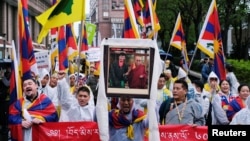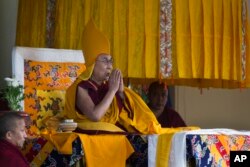Sunday marks the 60th anniversary of Tibet's failed uprising against China.
The abortive mission forced the Dalai Lama, Tibet's traditional Buddhist leader, into exile in mountainous Dharamsala, in India, where he established a Tibetan government-in-exile.
He launched his campaign for a free Tibet from Dharamsala. His efforts earned him worldwide respect and fame as an adherent of non-violence.
He won the Nobel Peace Prize in 1989.
The 83-year-old Dalai Lama continues to live in Dharamsala.
Devotees at the Dalai Lama's temple in Dharamsala observed the anniversary Sunday with chants and prayers. Some had painted "Free Tibet" on their faces.
A photo exhibit entitled "60 Years of Tibetan Resistance" is on display at the Tibet museum in Dharamsala.
A march, marking the anniversary, was planned in New Delhi, India's capital.
Under Chinese rule, critics say Tibet's unique cultural heritage and language are slowly fading away.
China insists that Tibet has been under Chinese rule for centuries, but Tibetans insist they were essentially independent for most of that time.
An editorial in China's official Xinhua News Agency said Saturday that under China's rule Tibet has experienced economic growth, increased lifespans and improved education.
Xinhua said "Sixty years since the epoch-making democratic reform in Tibet, people... have enjoyed unprecedented human rights in history."
Tibet monitoring groups, however, disagree with that assessment.
The International Tibet Network said in a statement that "China has ridden roughshod over the human and political rights of citizens under its rule for far too long." It added: "With resistance by the Tibetan people so strong and vibrant, it's time for a response from the international community that matches their courage and conviction."






